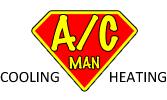Houston AC Repair Company: A Master Checklist To For Standard Air Conditioning Maintenance?
Just like your car needs maintenance on a regular basis to run properly and smoothly, your air conditions also need to have care on a regular basis. Caring for your air conditioner proactively will help to extend your unit’s life, and also save you a lot of money on Houston AC repair and replacement expenses. Something as basic as changing your unit’s air filter can also prolong its efficiency and improve your home’s air quality. Soon, many homeowners will be seeking relief from the summer heat that comes from an air conditioning system from AC Man Of Houston. You need your system not only to cool your house the first day that it gets hot outside but each time you turn on your air conditioning system this summer for your commercial or residential property.
Essential Indoor Equipment For Your Overall Health And Well Being
Start with the thermostat on “off” and the temperature turned to around 80 degrees. The steps below serve as a guide to help you understand whether your air conditioning system needs maintenance. By checking through the list below you can avoid high costs of repair by making sure to stay on track with your ac system. Check the following:
1. Check out the thermostat.
Is it an outdated one? You can save energy and money by installing a new programmable thermostat.
2. Any exposed ductwork should be checked for wear
That can be a source of inefficiency or cooling loss in the house.
3. Check out the air vents that are around your house
Remove all items that might block airflows, like toys, furniture, or drapes.
4. Check out the drain line
The drain is located near the indoor cooling coil, usually mounted to the basement over the furniture. Flushing a cup of chlorine bleach down the air conditioning drain and rinsing it with one gallon of water, will help your drain stay clear all summer long. Drain lines on your air conditioner can become clogged whenever there if dirt build-up that the indoor coil collects. Clogged AC line damage can occur whenever the A/C drain line becomes clogged. Whenever the drain line gets clogged, there still needs to be somewhere for the water to go. At first, there will be a back-up of water inside of the drain pan. That can result in your home suffering serious water damage. Your drains lines should be professionally cleaned once a year at least.
5. Change the air filter
You should change the filter every three months (or follow the manufacturer recommendations) and definitely before the heating or cooling season starts.
6. Circuits
Be sure that you are aware of everything that is happening so you can prevent damages from occurring while trying to fix this. Also, you want to make sure to check circuits to ensure that electrical connections are turned on.
7. Power is turned off
Make sure that the power is turned on at the air conditioning/furnace unit. The next step is to check for wear and overgrowth on the outdoor equipment. Essential Outdoor Equipment For Your System
8. Inspect the outdoor condenser unit
Check to be sure that are no blockages near or inside of the equipment. Also, clean the area surrounding the unit. Debris, vines, or leaves can block the internal components and performance can be affected.
9. Visually inspect the refrigerant lines
These lines need to be insulated. If they are insulated properly it will help to improve the system’s efficiency. Repairs to refrigerant lines or insulation should be performed by a professional.
10. Check electrical wiring
Check to ensure that the outdoor electrical wiring does not have any wear on it. If you do see any wear or damage, call a professional to have it serviced before you use your system.
11. AC retirement age
Be familiar with when your air conditioner might have reached its retirement age. All air conditions have a certain lifespan. Even if you properly maintain it, it will wear out eventually.
For further information on Houston ac repair services we offer, contact us by calling us today. For more related content, check out our blog.
